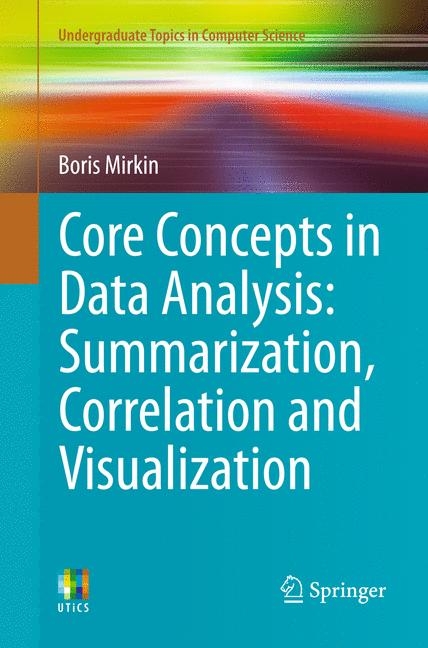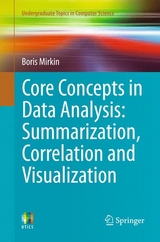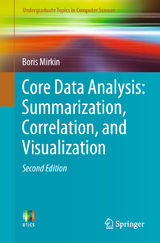Core Concepts in Data Analysis: Summarization, Correlation and Visualization
Seiten
2011
|
2011 ed.
Springer London Ltd (Verlag)
978-0-85729-286-5 (ISBN)
Springer London Ltd (Verlag)
978-0-85729-286-5 (ISBN)
- Titel erscheint in neuer Auflage
- Artikel merken
Zu diesem Artikel existiert eine Nachauflage
With in-depth descriptions of data analysis techniques both for summarizing and correlation, the author’s unconventional approach employs the concept of multivariate data summarization as an alternative to conventional machine-learning prediction methods.
Core Concepts in Data Analysis: Summarization, Correlation and Visualization provides in-depth descriptions of those data analysis approaches that either summarize data (principal component analysis and clustering, including hierarchical and network clustering) or correlate different aspects of data (decision trees, linear rules, neuron networks, and Bayes rule).
Boris Mirkin takes an unconventional approach and introduces the concept of multivariate data summarization as a counterpart to conventional machine learning prediction schemes, utilizing techniques from statistics, data analysis, data mining, machine learning, computational intelligence, and information retrieval.
Innovations following from his in-depth analysis of the models underlying summarization techniques are introduced, and applied to challenging issues such as the number of clusters, mixed scale data standardization, interpretation of the solutions, as well as relations between seemingly unrelated concepts: goodness-of-fit functions for classification trees and data standardization, spectral clustering and additive clustering, correlation and visualization of contingency data.
The mathematical detail is encapsulated in the so-called “formulation” parts, whereas most material is delivered through “presentation” parts that explain the methods by applying them to small real-world data sets; concise “computation” parts inform of the algorithmic and coding issues.
Four layers of active learning and self-study exercises are provided: worked examples, case studies, projects and questions.
Core Concepts in Data Analysis: Summarization, Correlation and Visualization provides in-depth descriptions of those data analysis approaches that either summarize data (principal component analysis and clustering, including hierarchical and network clustering) or correlate different aspects of data (decision trees, linear rules, neuron networks, and Bayes rule).
Boris Mirkin takes an unconventional approach and introduces the concept of multivariate data summarization as a counterpart to conventional machine learning prediction schemes, utilizing techniques from statistics, data analysis, data mining, machine learning, computational intelligence, and information retrieval.
Innovations following from his in-depth analysis of the models underlying summarization techniques are introduced, and applied to challenging issues such as the number of clusters, mixed scale data standardization, interpretation of the solutions, as well as relations between seemingly unrelated concepts: goodness-of-fit functions for classification trees and data standardization, spectral clustering and additive clustering, correlation and visualization of contingency data.
The mathematical detail is encapsulated in the so-called “formulation” parts, whereas most material is delivered through “presentation” parts that explain the methods by applying them to small real-world data sets; concise “computation” parts inform of the algorithmic and coding issues.
Four layers of active learning and self-study exercises are provided: worked examples, case studies, projects and questions.
Introduction.-1D Analysis: Summarization and Visualisation of a Single Feature.-2D Analysis: Correlation and Visualition of Two Features.-Learning Multivariate Correlations in Data.-Principal Component Analysis and SVD.-K-Means and Related Clustering Methods.-Hierarchial Clustering.-Approximate and Spectral Clustering for Network and Affinity Data.
| Reihe/Serie | Undergraduate Topics in Computer Science | Undergraduate Topics in Computer Science |
|---|---|
| Zusatzinfo | 131 Tables, black and white; 129 Illustrations, black and white; XX, 390 p. 129 illus. |
| Verlagsort | England |
| Sprache | englisch |
| Maße | 155 x 235 mm |
| Gewicht | 629 g |
| Themenwelt | Informatik ► Theorie / Studium ► Künstliche Intelligenz / Robotik |
| Mathematik / Informatik ► Mathematik | |
| ISBN-10 | 0-85729-286-2 / 0857292862 |
| ISBN-13 | 978-0-85729-286-5 / 9780857292865 |
| Zustand | Neuware |
| Haben Sie eine Frage zum Produkt? |
Mehr entdecken
aus dem Bereich
aus dem Bereich
Buch | Softcover (2024)
REDLINE (Verlag)
CHF 27,95
Eine kurze Geschichte der Informationsnetzwerke von der Steinzeit bis …
Buch | Hardcover (2024)
Penguin (Verlag)
CHF 39,20





